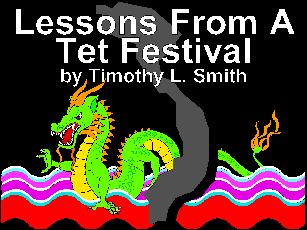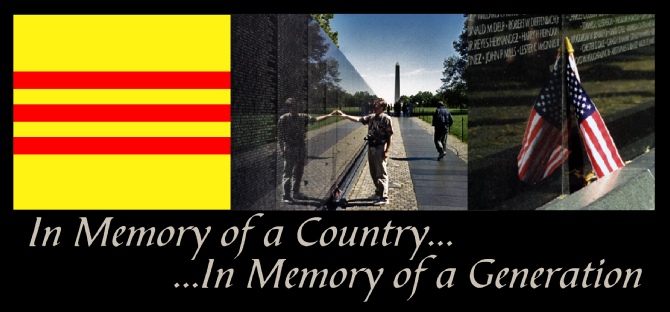The Original 1995 Article: “Lessons From a Tet Festival”
As a Baby Boomer, I am a child of the 60’s, the same as the next person. I was strongly against the Vietnam War, and cut my political teeth on Eugene McCarthy, Ernest Gruening, Wayne Morse and the Berrigan brothers. When Country Joe sang, “...1, 2, 3, what are we fighting for?” I and millions of others knew the correct answer. The smooth posturings of the great Military Industrial Complex as it explained its noble motives (and substantial profits), were righteously regarded as evil, dangerous foolishness by my generation. The quaint ideas held forth by our national leaders, the “Domino Theory” and the defense of freedom, were easily dismissed; after all, they kept getting themselves stuck without permission in places like Cambodia and Democratic Headquarters.
It’s not so simple, as it turns out. The intervening years have taught me much. “Don’t
trust anyone over thirty” rings very hollow when you’re over forty. It is not so
much that my opinion of the war or our handling of it has changed, but that I have
actually come to know what we were fighting for. The scene changes to Pomona, California,
in 1995. As a new teacher of English as a Second Language, I was eagerly learning
the ways of some of the cultures represented in my classroom. A group of Vietnamese
immigrants hosted a New Year’s party for the Year of the Boar, and I was an honored
guest. On the wall of the school auditorium was the flag of a once-
The speeches spoke of the power of freedom, the love of a long-
I left early, after three solid hours, escorted out by an enthusiastic group of my
students, honored to near speechlessness by my presence. I felt the same; I am so
honored that they are here, and proud that America, for all its faults, is still
what it is. Things are clearer now. Images of the era such as Hollywood celebrities
taking photo-
I speak now as someone who registered as a Conscientious Objector, and whose Draft
lottery number was 98 in a year that only conscripted up to number 75. I think of
the so-
I see my Vietnamese-




Information from this site can be used for non-

To Find Out More About Tanignak.com, Click HERE
To Visit My “About Me” Page, Click HERE
To Return to Tanignak “Home,” Click the Logo Below:
Tet Lesson – Thoughts on the Vietnam War
By Timothy Smith, Originally written in 1995, latest revision in 2020
The Lesson from a Tet Festival
One of Three Articles About the Vietnamese-
Introduction to the 2020 Re-
This little opinion piece was originally written in 1995, when Lora Pham invited me to a Tet Festival, the Vietnamese Lunar New Year celebration, held in Pomona, California. To read more about Lora and her remarkable journey to freedom, please see “The Old Refugee Boat” article, posted on this site. I wrote this article to hand out to various friends and colleagues at the high school where I was teaching. Four years later, with a new website, I adapted it as an online article. I preserved my original attempt at computer graphics on the left for your amusement. And for the generation that is tempted to try the type of government these people fled, may I suggest looking into the life stories of those who endured and escaped it.
Sincerely, Timothy Smith, March 2020
The original flag of The Republic of (South) Viet Nam, a country which no longer exists. The author at “The Wall” in 1997. A small flag near the name of someone’s relative.

For the other articles on the Vietnamese-